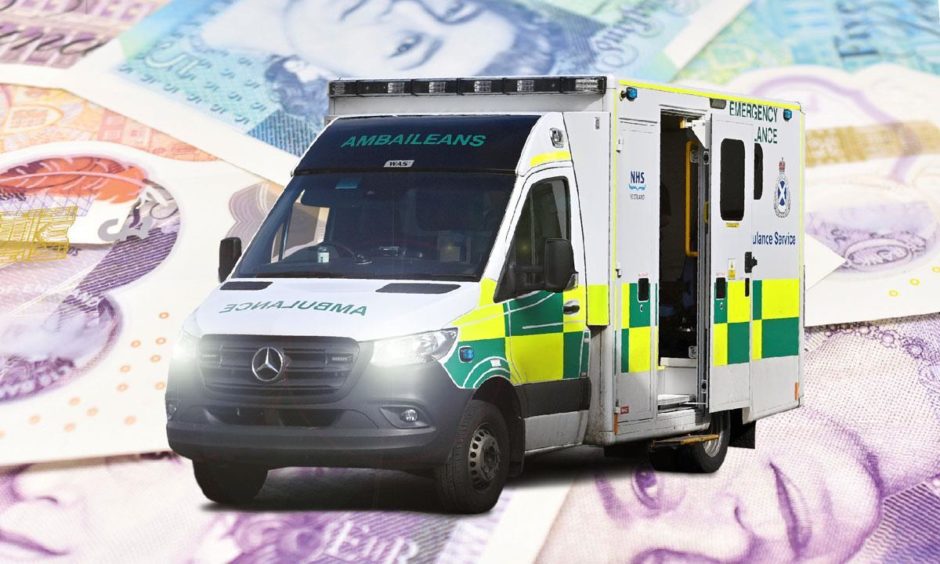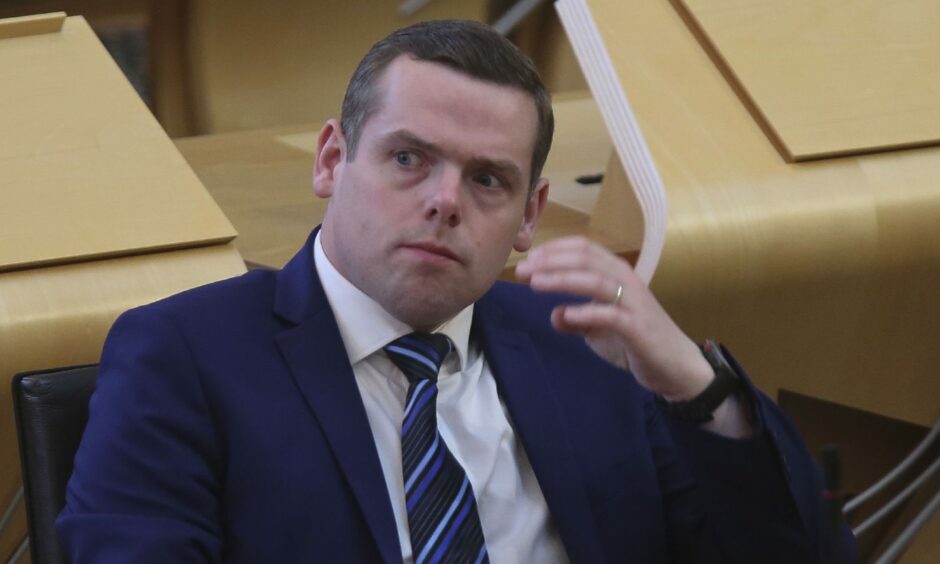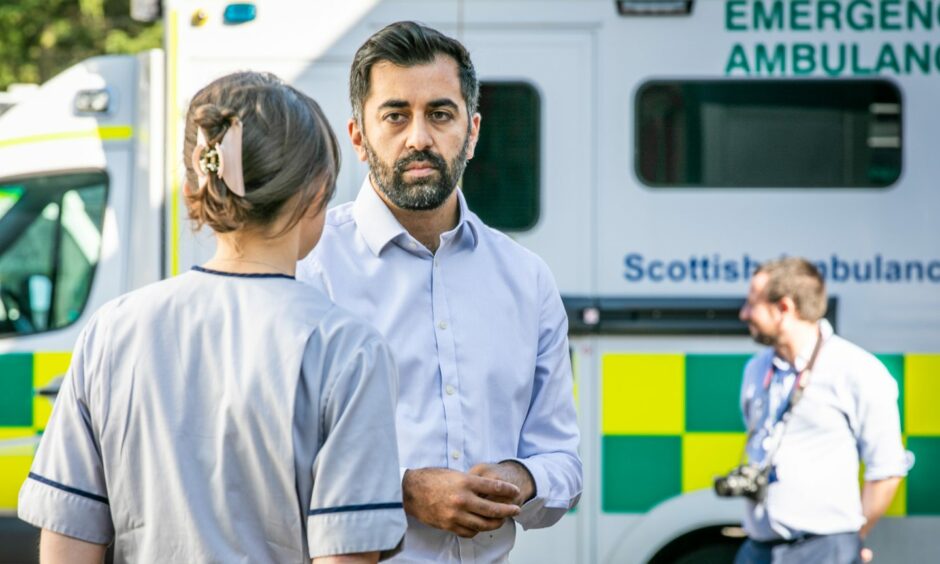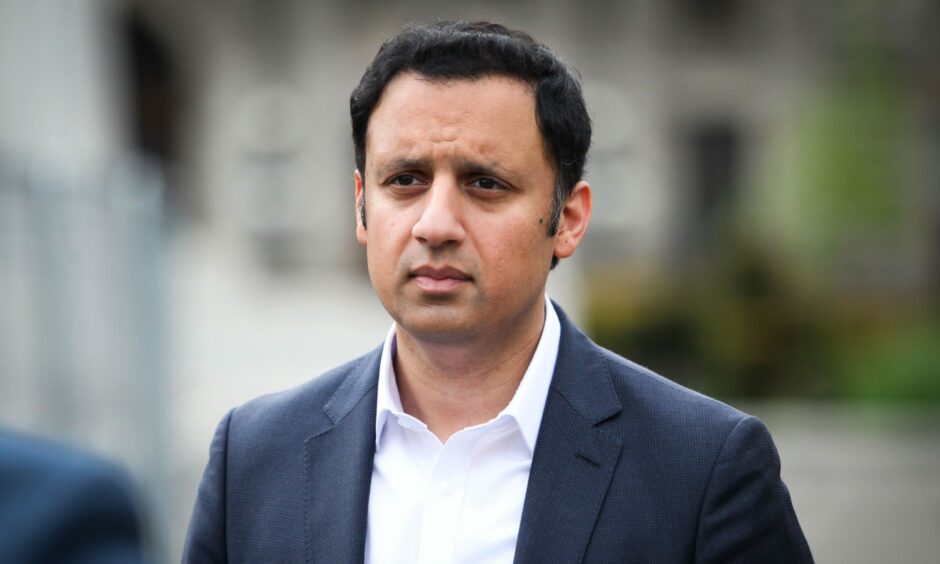Nicola Sturgeon has called in the Army to help alleviate Scotland’s 999 crisis as she “apologised unreservedly” to anyone who has faced unacceptably long waits for an ambulance.
Ms Sturgeon faced a grilling from opposition leaders at first minister’s questions on Thursday, with the NHS in Scotland facing growing pressure and emergency workers dealing with around 10,000 more calls a month than last summer.
It comes after we revealed a series of shocking waiting times across the country and how one rural community group had even been forced to fundraise to improve emergency cover in their area.
Scottish Conservative leader Douglas Ross said “scandalous waiting times” had “cost people’s lives” as he raised the case of 65-year-old Gerard Brown.
An investigation has been launched after the pensioner, who was found collapsed at his home in Glasgow, died following a 40-hour wait for an ambulance. Mr Brown’s family say they were told the delay cost him his life.
His GP, who repeatedly warned call handlers that Mr Brown’s condition was critical, described the situation as “third world medicine”.
‘I apologise unreservedly’
Ms Sturgeon agreed the man’s treatment was “unacceptable” but insisted services are facing “acute pressure” because of the Covid-19 pandemic, and said ambulance crews are “responding heroically to these challenges”.
“I apologise unreservedly to anyone who has suffered or is suffering unacceptably long waits,” she added.
The first minister said “targeted military assistance” was being considered to help ease the pressures, as has already happened in England, and the Ministry of Defence confirmed hours later it had received a request from the Scottish Government under the Military Aid to Civilian Authority process.
Quieter wards in hospitals could also be temporarily requisitioned to allow ambulances to drop off patients, so they can get back on the road and deal with other 999 calls.
Ms Sturgeon was repeatedly challenged to accept the ambulance service is in crisis during the exchange, as Mr Ross highlighted earlier comments by health secretary Humza Yousaf that people should “think twice” before calling for an ambulance.
Comments are ‘dangerous and reckless’
The Scottish Tory leader described the comments as “dangerous and reckless” and called on Ms Sturgeon to withdraw them on behalf of the Scottish Government and apologise.
Mr Ross claimed that “Humza Yousaf is the problem”, accusing the health secretary of telling people “don’t look after your own health”, and said he should “think twice” before speaking in future.
“These heartbreaking stories of people dying and suffering in agony while waiting for an ambulance must be a wake-up call to the SNP Government,” he said.
“Systemic failures are leaving ambulance crews to turn up and pronounce people dead, instead of having a chance of saving a life.
“For two weeks in a row, Nicola Sturgeon has been in denial that our NHS is in crisis. Admitting the scale of the problem is essential to tackling it.”
Ms Sturgeon said the current situation is “probably the most challenging combination of circumstances that our health service has faced since its establishment” but where people think they need an ambulance “they should never hesitate in calling”.
Opposition MSPs were incredulous when the SNP leader said it would take until next week for the health secretary to update parliament on the issue.
Avoidable human tragedy
Scottish Labour leader Anas Sarwar, who also challenged Ms Sturgeon on ambulance wait times, said her answers show “she doesn’t understand the scale of the crisis in Scotland’s health service”.
“To hear she is considering maybe acting at some point to intervene just isn’t good enough,” he said.
“This isn’t about the pandemic. There were problems before it.
“This is an avoidable human tragedy on a heartbreaking scale. Pandemic or no pandemic, there’s a simple truth: no-one should be left to die on the floor while waiting 40 hours for an ambulance.”
Mr Sarwar said things are so bad, the British Red Cross has been drafted in to deliver humanitarian aid at Glasgow’s flagship hospital. He urged the first minister to declare a “major incident”.
Ms Sturgeon said the country is facing “probably the most challenging winter for the health service and society in probably any of our lifetimes” and coping with the crisis is going to be a responsibility for government “right through this winter”.
She said pop-up wards are being considered but these might not be suitable for patients this winter, adding that “temporary admission wards” might be the preferred route.
A history of failures
We reported this week how “significant issues” have been raised over rural ambulance provision after it emerged one community will have to fundraise for its own vehicle.
MSP Alexander Burnett warned of “major” funding problems for rural cover since Braemar was stripped of its own emergency medical service in 2007.
We also previously revealed how more than 11,000 ambulances have been dispatched with a single crew member on board over the past five years, despite repeated assurances the practice would only be used in “exceptional circumstances”.
The issue of single crewing was highlighted again in November after care home manager Pam Anderson died on her way to hospital in Aberdeen.

It emerged the 74-year-old had to wait 40 minutes for a two-person crew from Tomintoul to transport her for treatment, as the first ambulance to arrive had only one crew member so was not allowed to take her.
Nicola Sturgeon warned against single-crew call-outs while she was health secretary more than a decade ago and promised “action to eliminate rostered single-manning” would be taken.
Speaking before first minister’s questions, Mr Yousaf, who was seen tumbling on his way to the chamber from a scooter he has used since rupturing his Achilles playing badminton, admitted the size of the challenge, particularly in rural areas.
The health secretary @HumzaYousaf does not appear to be having a good day at work…
H/T @STVAlison pic.twitter.com/BAolpCEmqX
— Glenn Campbell (@GlennBBC) September 16, 2021
He was grilled by Mid Scotland and Fife MSP Murdo Fraser, who said concerns were high before the pandemic.
“It’s clear the situation is much more serious despite the efforts of ambulance staff,” Mr Fraser said. “This morning’s headlines make grim reading, with people dying as a result of ambulance delays. This has become a national crisis.”
Mr Yousaf accepted there is a problem, adding: “You’ll not get a defence from me of some of those unacceptable waiting times. What I want to give an assurance of, is no one is sitting on their hands.”
He said staff were being recruited in the north and north east.


